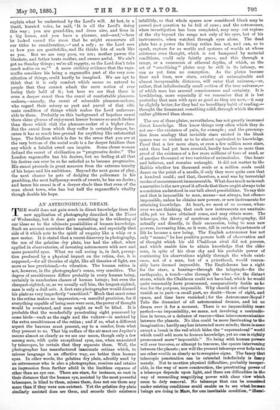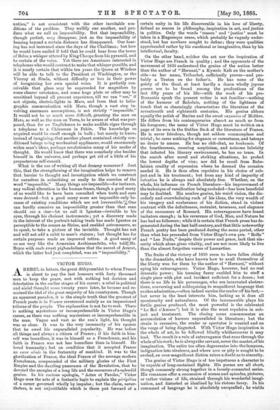AN ASTRONOMICAL DREAM.
THE world does not gain much in direct knowledge from the new application of photography described in the Times of Wednesday, but it does gain something in the widening of our ideas as to the ultimate possibilities of human knowledge. Such an account nourishes the imagination, and especially that side of it which acts to the spirit of enquiry like a whip or a new motor. It is stated that a recent discovery in photography, the use of the gelatine dry plate, has had the effect, when applied in observatories, of investing astronomers with new and more powerful eyes. What we call seeing is, in fact, perception produced by a physical impact on the retina, due, it is supposed,—for all theories of sight, like all theories of light, are more or less provisional,—to vibration. The human retina is not, however, in the photographer's sense, very sensitive. The degree of sensitiveness differs probably in every human being, certainly in numberless classes of human beings; but even the sharpest-sighted, or, as we usually call him, the longest-sighted, man is only a dull seer. A first-rate photographer would discard his plate as very imperfectly "sensitized." Much that must come to the retina makes no impression,—a merciful provision, for if everything capable of being seen were seen, the power of thought would be overtaxed, and man might as well be blind. It is probable that the wonderfully penetrating sight possessed by some birds—such as the eagle and the vulture—is assisted by the extra sensitiveness of the retina; and if so, what a different aspect the heavens must present, say to a condor, from what they present to us. That big ruffian of the air must see Jupiter's moons almost as clearly as we see our moon, though only a few among men, with quite exceptional eyes, can, when unassisted by telescopes, be certain that they separate them. Well, the photographer has manufactured inanimate retinas which, to misuse language in an effective way, see better than human eyes. In other words, the gelatine dry plate, adroitly used by an astronomer who is also a photographer, receives and retains an impression from further afield in the limitless expanse of ether than an eye can. There are stars, for instance, so vast in their distance that the human eye, assisted by the most powerful telescopes, is blind to them, misses them, does not see them any more than if they were non-existent. Yet the gelatine dry plate similarly assisted does see them, and records their existence infallibly, so that whole spaces now considered blank may be proved past question to be full of suns ; and the astronomer, when investigation has been completed, may map out regions of the sky beyond the range not only of his eyes, but of his instruments, when watched through eyes alone. The dead plate has a power the living retina has not, and can, so to speak, capture for us worlds and systems of worlds at whose existence even thought, which is not hampered by material conditions, could only faintly guess, and this through a range, or a succession of ethereal depths, of which, as the art of " sensitizing " plates may be still in its infancy, we can as yet form no conception. As the plates become finer and finer, new stars, existing at unimaginable and almost inexpressible distances, will enter that universe,—or, rather, that infinitesimally small section of the true universe,— of which man has sensual consciousness and certainty. It is bewildering, more especially if we remember that it is but yesterday that men with eyes as good as they are now,—it may be slightly better, for they had no hereditary habit of reading,— thought the firmament something solid, through which the stars rather glittered than shone.
The use of these plates, nevertheless, has not greatly increased direct knowledge. Men know things very often which they do not see—the existence of pain, for example ; and the presumption from analogy that invisible stars existed in the blank spaces was so violent as to be almost equivalent to knowledge. Proof that a few more stars, or even a few million more stars, exist than had yet been counted, hardly teaches us more than proof of the existence of a few more millions of tons of sand, or of another thousand or two varieties of animalcules. One hears and believes, and remains untaught. It did not matter to the Rabbis whether ten thousand souls or a million souls could dance on the point of a needle, if only they were quite sure that a hundred could ; and that, therefore, a soul was by terrestrial modes of measurement immensurable. What does teach LIB in such a narrative is the new proof it affords that there ought always to be a condition understood in our talk about possibilities. To say this and that is impossible to man, means—not always, but often— impossible, unless he obtains new powers, or new instruments for attaining knowledge. At heart, we most of us assume, whenever we are thinking, that such new instruments are unattainable, yet we have obtained some, and may obtain more. The telescope, the theory of spectrum analysis, photography, did actually and directly, in their succession, bring to man new powers, increasing him, as it were, till in certain departments of life he became a new being. The English astronomer has not only "means," he has positive powers both of observation and of thought which his old Chaldwan rival did not possess, and which enable him to attain knowledge that the elder man, in spite of his clear sky and his probable power of continuing his observations nightly through the whole existence, not of a man, but of a priesthood, would reasonably have deemed impossible. The Englishman has a eight for the stars, a hearing—through the telegraph—for the earthquake, a touch—also through the wire—for the distant storm, which the Chalchean could not have had, which he would quite reasonably have pronounced, comparatively feeble as he was for the purpose, impossible. Why should not other barriers vanish as in part—a small part, no doubt—those of sight, and space, and time have vanished j for the Astronomer-Royal P Take the dreamiest of all astronomical dreams, and let ns dream over it for a moment. There is no impossibility more perfect—no impossibility, we mean, not involving a contradiction in terms, or a defiance of reason—than intercommunication between the planets. No idea could be more fascinating to the imagination; hardly any has interested more minds; there is none except a break in the veil which hides the " supernatural " would which could add more to human knowledge, yet no one is rightly pronounced more" impossible." No being with human powers will ever traverse, or attempt to traverse, the spaces intervening between the planets ; nor will the present telescope ever help us to see other worlds so clearly as to recognise signs. The fancy that telescopic penetration can be extended indefinitely is fancy merely. Not to mention physical difficulties, probably insuperable, in the way of mere construction, the penetrating power of a telescope depends upon light, and there are difficulties in the way of reconciling magnifying power with clear view which seem to defy removal. No telescope that can be conceived under existing conditions could enable us to see what human beings are doing in Mars, for one inevitable condition, " illtnni nation," is not consistent with the other inevitable conditions of the problem. They nullify one another, and produce what we call an impossibility. But that impossibility, though perfect, may disappear, just as the impossibility of hearing beyond a certain distance has disappeared. Our hearing has not increased since the days of the Chaldiean ; but how he would have smiled if told that he could hear from the tower of Belus a whisper uttered by King Cheops from his pyramid, and be certain of the voice. Yet there are Americans interested in telephones who would contract to make that whisper possible, and it is nearly certain that within ten years the Queen at Windsor will be able to talk to the President at Washington, or the Viceroy at Simla, without difficulty or loss in their power of recognising her own special voice. It is perfectly conceivable that glass may be superseded for magnifiers by some clearer substance, and some huge plate or other may be sensitized beyond all present experience, till we can "see," if not objects, electric-lights in Mars, and from that to heliographic communication with Mars, though a vast step involving enormous assumptions, is not strictly "impossible." It would not be so much more difficult, granting the man on Mars, as well as the man on Terra, to be aware of what was purposed, than for an Englishman to make audible signs through a telephone to a Chinaman in Pekin. The knowledge so acquired would be small enough in bulk ; but merely to know, instead of imagining, that another planet contained strictly conditioned beings using mechanical appliances, would enormously widen man's ideas, perhaps revolutionise many of his modes of thought. He would know that there was somebody else besides himself in the universe, and perhaps get rid of a little of his preposterous self-conceit.
What is the use of writing all that dreamy nonsense ? Just this, that the strengthening of the imagination helps to remove that barrier to thought and investigation which we construct for ourselves in submitting so easily to the coercion of the word " impossible." Many things are impossible—for instance, any radical alteration in the human frame, though a good many of us would like to have been consulted when teeth and eyes were decreed—but a good many more are impossible only because of existing conditions which are not irreversibleci, One can hardly conceive an impossibility greater than that man should see a star—let us call it Ignotus—invisible to his eyes, through his choicest instruments ; yet a discovery made in the interest of the portrait-taking trade has made Ignotus as perceptible to the senses as Sirius, and enabled astronomers, so to speak, to take a picture of the invisible. Thought has not -and will not add a cubit to man's stature; but thought has for certain purposes made an improved retina. A good many of us are very like the Armenian Archimandrite, who told]Mr. Bryce with such sweet pigheadedness that the ascent of Ararat, which the latter had just completed, was an " impossibility."















































 Previous page
Previous page